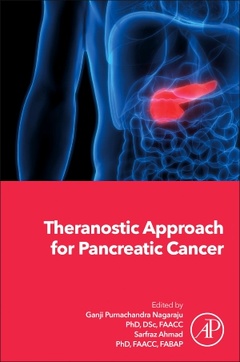Theranostic Approach for Pancreatic Cancer
Coordonnateurs : Nagaraju Ganji Purnachandra, Ahmad Sarfraz

Theranostic Approach for Pancreatic Cancer modulates the biologic properties of stroma in pancreatic cancer by targeting the several chemotherapy resistance mechanisms to impede their malignant property through introducing new strategies and drugs for tackling the disease. It brings information about ongoing research as well as clinical data about pancreatic cancer and provides detailed descriptions about diagnostic and therapeutic options for easy understanding. The book discusses several topics related to pancreatic cancer, such as stem cells, drug resistance and pancreatic tumor microenvironment, the latest developments in chemotherapy for metastatic cancer and chemoprevention, and epigenome as a therapeutic strategy.
Additionally, it encompasses a discussion on theranostic clinical applications for personalized treatment and management of pancreatic cancer. The book is a valuable resource for cancer researchers, oncologists, and several members of the biomedical field who need to understand more about the diagnosis and treatment of pancreatic cancer.
Cancer researchers, medical scientists, clinicians, graduate students
Prof. Ahmad S is Director of Clinical Research at AdventHealth Cancer Institute (AHCI), Orlando, FL, USA. He earned his PhD in Biochemistry from North-Eastern Hill University, Shillong. Prof. Ahmad’s research focus is on the analyses of clinico-pathologic and surgical outcomes of oncology, hematology, and gastroenterology (GI) patients and to better understand the cellular/molecular mechanisms of cancer and related thromboembolic/hematologic disorders. Prof. Ahmad has published over 250 peer-reviewed scholarly research articles and book chapters, and over 400 scientific abstracts. He is a reviewer and has editorial responsibilities for several biomedical journals and books; and has received competitive research grants and national/international awards for his research contributions/accomplishments
- Provides information on the roadblocks of chemotherapy in patients with newly diagnosed and metastatic pancreatic cancer<
- Discusses treatment options available currently and prospective options for the future
- Focuses especially on stroma, tumor microenvironment, stem cells, stellate cells, transcription factors, growth factors, and important signaling pathways as already tested types of treatment
Date de parution : 08-2019
Ouvrage de 410 p.
15x22.8 cm
Thème de Theranostic Approach for Pancreatic Cancer :
Mots-clés :
Antisense oligos; Biomarkers; CA 19–9Diagnosis; Cancer stem cells; CHD; Chemopreventive agents; Chemoresistance; Chemotherapy resistance; Chemotherapy; Chromatin remodeling; Clinical outcomes; DNA repair; EGFR inhibitors; Emerging treatments; Epidemiology; Epigenetics; EUS; Exosomes; Fluorouracil; Gemcitabine; Gene mutation; Genetic manipulation; Genetic predisposition; Genetic susceptibility; Genetic variants; Immune suppressors; Immune surveillance; Immunotherapy strategies; Immunotherapy; Int


